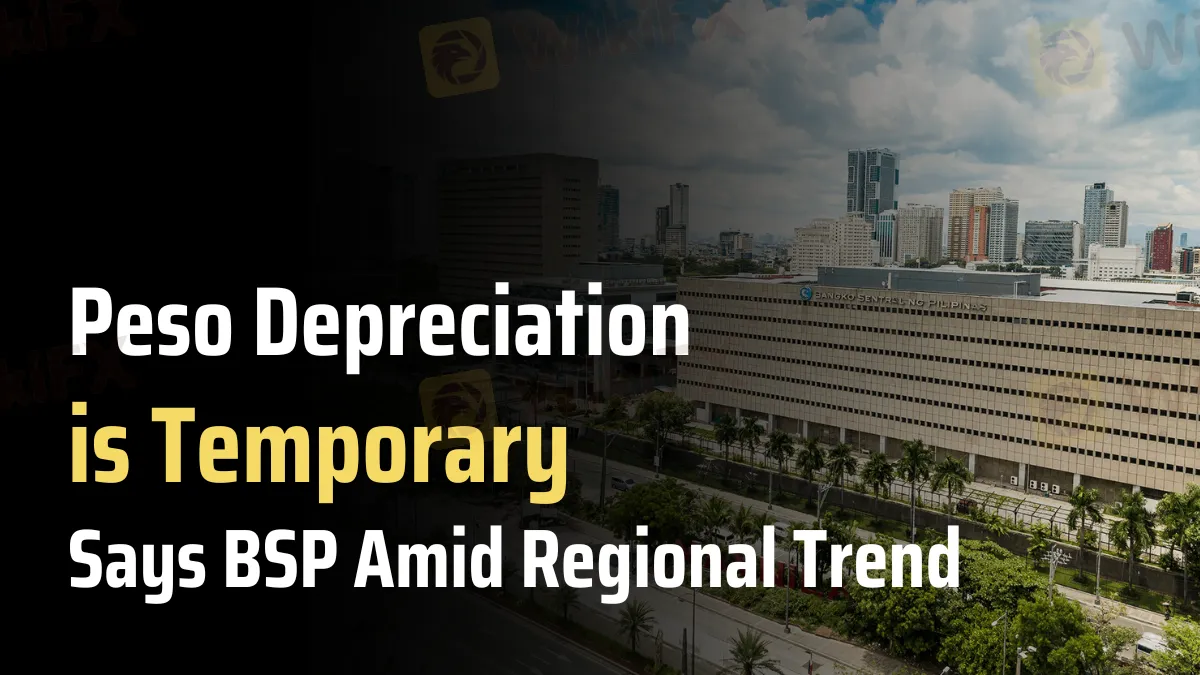简体中文
繁體中文
English
Pусский
日本語
ภาษาไทย
Tiếng Việt
Bahasa Indonesia
Español
हिन्दी
Filippiiniläinen
Français
Deutsch
Português
Türkçe
한국어
العربية
Peso Depreciation is Temporary, Says BSP Amid Regional Trend
Abstract:The BSP assures the public that the Philippine Peso's recent depreciation is temporary, reflecting a regional trend of weakening currencies against the US dollar.

In Manila, the Bangko Sentral ng Pilipinas (BSP) has reassured the public that the recent depreciation of the Philippine Peso (PH Peso) is just transitory, citing a larger regional trend of currencies falling versus the US dollar. This declaration comes after the peso fell to P58.27 to the dollar last week, the lowest level since November 2022.

During the Philippine Economic Briefing, BSP Senior Assistant Governor Iluminada Sicat addressed concerns, noting that the present depreciation is affected by external forces and would stabilize once these difficulties have been handled. Sicat indicated that this is merely a temporary situation. Once things settle down, the exchange rate will be determined by the fundamentals.
Sicat highlighted the regional context, saying, “We also look at what's going on in the neighborhood. Are we the only ones deteriorating or not?” This shows the BSP's view that the peso's fluctuation is part of a bigger trend impacting many currencies.
Despite the peso's dip to P58.27 on May 21, Sicat said that the government does not aim for a set exchange rate level, allowing market forces to define the rate. She did, however, emphasize the significance of monitoring market strains to avoid inflation expectations from increasing.

Ragnar Gudmundsson, the IMF's resident representative in the Philippines, agreed with this viewpoint, highlighting the significance of central banks making data-driven judgments. “Foreign exchange flexibility should be a priority,” he added, adding that combining it with a realistic inflation targeting framework is critical for investor confidence.
Gudmundsson said that despite possible concerns from global tensions and local wage demands, Philippine trends are mainly encouraging. He emphasized the need of addressing volatility induced by changes in the policies of the United States Federal Reserve. One of the recommended remedies is a combination of monetary and non-monetary measures, such as importing cheaper food goods to help needy families deal with high food costs.
The BSP's strategy is consistent with these guidelines, concentrating on preserving price stability while controlling market expectations. “We have to hold the line on that front... with a continued commitment to price stability,” said Gudmundsson.
Overall, the BSP and IMF announcements seek to reassure the public and investors that the present devaluation of the Philippine Peso is a transitory occurrence affected by larger regional dynamics and foreign causes. The BSP's commitment to market-driven exchange rates and price stability is central to its policy in this era of currency volatility.
Also, access the latest news here.

Disclaimer:
The views in this article only represent the author's personal views, and do not constitute investment advice on this platform. This platform does not guarantee the accuracy, completeness and timeliness of the information in the article, and will not be liable for any loss caused by the use of or reliance on the information in the article.
Read more

Bank Negara Malaysia Flags 12 New Companies for Unauthorised Activity
Bank Negara Malaysia (BNM) has updated its Financial Consumer Alert List (FCA List) by adding 12 more entities, reinforcing its efforts to warn the public against unregulated financial schemes. Check if your broker made the list!

TradingView Brings Live Market Charts to Telegram Users with New Mini App
TradingView has launched a mini app on Telegram, making it easier for users to track market trends, check price movements, and share charts.

Georgia Man Charged in Danbury Kidnapping and Crypto Extortion Plot
Georgia man James Schwab charged in Danbury kidnapping tied to $230M crypto heist. Plot targeted couple for ransom after Miami altercation with son.

Bybit Shuts Down NFT Marketplace Amid Crypto Market Downturn
Bybit announces the closure of its NFT marketplace, citing efforts to streamline offerings. Discover the latest trends in the declining NFT market and its shift to utility-based growth.
WikiFX Broker
Latest News
The Withdrawal Trap: How Scam Brokers Lure Victims into Paying More
FCA to Investors: Think Twice Before Trusting These Brokers
Trump\s tariffs: How could they affect the UK and your money
Trump gambles it all on global tariffs he\s wanted for decades
TradingView Brings Live Market Charts to Telegram Users with New Mini App
Trump tariffs: How will India navigate a world on the brink of a trade war?
IG Group Acquires Freetrade for £160M to Expand UK Investment Market
U.S. March ISM Manufacturing PMI Released
Should You Beware of Forex Trading Gurus?
Exposed by SC: The Latest Investment Scams Targeting Malaysian Investors
Currency Calculator







